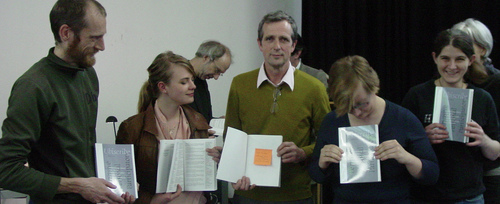So went out and bought Van Bastelaere’s ‘De voorbode van iets groots’ at De Tribune, Maastrichts nicest bookstore. Read through it once now. I do not read poetry slowly, at least not when reading through it the first time. And wrt Van Bastelaere I have the impression that some poems work best when read rather quickly. Especially the poems in which he uses a lot of ‘fragments’ — just bits of language, quotations, cliche’s — will not work when read slowly. (I think now).
Marjorie Perloff wrote in the preface to Radical Artifice: Writing Poetry in the Age of Media, “There is today no landscape uncontaminated by sound bytes or computer blips, no mountain peak or lonely valley beyond the reach of the cellular phone and the microcassette player. Increasingly, then, the poet’s arena is the electronic world.” She wrote that in 1991.
The world of Van Bastelaere is made just as much of the mythology of action movies (a very one dimensional mythology, that he sort of deconstructs to show what desires are at play there — but because the mythology is one-dimensional, the deconstruction also comes out one-dimensional) and the postmodern desire and fear of catastrophe (the theme that keeps this book together). And there’s a messianic bit as well (in Whoooosssssh). The references are all well-known. And actually he often plays, I think, with quoting in very beautiful Dutch, sentences which one knows from for instance Burroughs (‘who scared you into this flesh?’), Gibson, Delillo or Ballard. At least, so is my impression. Or, for that matter, from action movies, or Blanchot.
Which make these poems a bit 1990’s as well. (They might be from the ’90s, partly, at least Zapruder Stress was already published (in a different form) years and years ago).
Van Bastelaere has a particular good ear for language, and plays often with making you expect one thing, then turning the sentence into another direction. Easy example: “Dit is waar / Het verhaal eindigt”; which makes you read: “This is true / The story ends”, immediately correcting yourself into reading “This is where / The story ends”). Van Bastelaere uses such poetic ‘tricks’ a lot, to good effect. Another is the use of loose bits of spoken language, just utterances, sometimes he just strings them together. They form a sort of language canvas… . It’s as with the ‘almost quotations’, that you think you remember recognize, but not quite, and before you can wonder about it, the poem is elsewhere already. This is the language of which our world is made (if you listen closely… a girl walks by the window and I hear her say ‘Ooh, dat is zo….’ )
It reminds me of Creeley’s use of rhythm. But a radicalized version of it.
I like those effects. I do not find them disturbing, I do not get the feeling that Van Bastelaere is playing a game against me, or tries to undermine my preconceptions of what poetry is or should be.
But then, I am a reader who is not bothered by not getting to the core of a ‘meaning’. I read poetry for rhythm and sound as much as for meaning. Or for the voyage through language.
My 2 cents. (For now).
